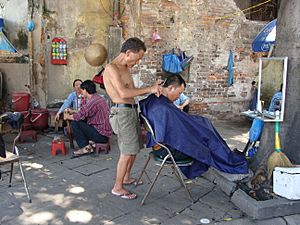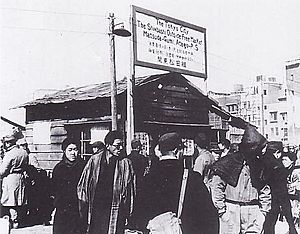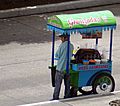Informal economy facts for kids
The informal economy is a part of a country's economy that isn't officially counted or taxed by the government. Think of it as work that happens "under the radar." This includes things like street vendors, small home-based businesses, or even people trading goods without official permits. It's different from the "formal economy," where jobs are registered, taxes are paid, and workers usually get benefits.
In many developing countries, a huge number of people, sometimes more than 70%, work in the informal economy. They often work for themselves because it's hard to find a regular job with an employer. People in these jobs usually don't get benefits like health insurance, paid time off, or social security (money for retirement or if they can't work). These benefits are usually only given to people who pay taxes through official jobs.
Contents
Why is it important?
The informal economy plays a big role in many countries, especially where there aren't enough formal jobs. It helps people earn money to live and supports their families. However, because it's not regulated, workers might not have good working conditions or fair pay.
Who works in the informal economy?
Often, more women work in the informal economy than men. About 60% of female workers in developing countries are in this sector. There are a few reasons for this:
- Many jobs available in the informal economy, like selling goods or making crafts, are often done by women.
- Many women work from home so they can also take care of their children. These types of jobs are usually part of the informal sector.
- Other women work as street vendors, which is also considered informal work.
Even though many women work in this sector, men often hold the higher-paying or leadership roles. For example, fewer women are employers who hire others, and more women are involved in smaller, less profitable businesses. This can lead to a bigger pay gap between men and women in the informal economy compared to the formal one.
What is the black market?
The informal economy also includes the black market. This is where goods or services are bought and sold illegally. For example, people might sell things that are stolen, fake, or that the government has banned. This part of the informal economy is against the law and can be dangerous.
Challenges of the informal economy
Working in the informal economy can be tough. People often face:
- Unstable income: Earnings can change a lot from day to day.
- No benefits: As mentioned, there are usually no health benefits, pensions, or unemployment support.
- Poor working conditions: Jobs might be unsafe or involve very long hours.
- Lack of protection: Workers have little legal protection if they are treated unfairly.
- No growth: It can be hard for small informal businesses to grow and become bigger, formal businesses.
Despite these challenges, the informal economy is a vital source of income for millions of people around the world.
Images for kids
-
Ice cream street vendor in Mexico.
-
Black market peddler on graffiti, Kharkiv
-
Daily life of the informal economy in the streets of Bolivia.
-
Waste picker in Indonesia
-
Street vendor in India
-
The Narantuul Market in Ulaanbaatar, Mongolia, colloquially also called Khar Zakh (Black Market)
-
Informal beverage vendor in Guatemala City
See also
 In Spanish: Economía informal para niños
In Spanish: Economía informal para niños
 | Kyle Baker |
 | Joseph Yoakum |
 | Laura Wheeler Waring |
 | Henry Ossawa Tanner |














